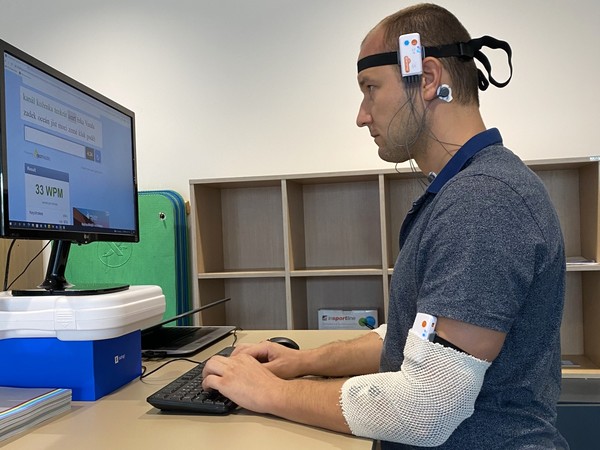Experts from five Czech universities and one private company have joined forces to develop a system for monitoring and evaluating selected risk factors of physical workload in the context of Industry 4.0. The project supported by the Technology Agency of the Czech Republic in the Trend programme also involved the Palacký University Faculty of Physical Culture (UP FPC), which extended the spectrum of target groups of the new technology to athletes, and even to administrative professions.
The result of the applied research is the development of a new technology and equipment for the evaluation of local muscle load during work operations by means of electromyography, including software, which is more user-friendly than the solutions used to date. Physical load is one of the risk factors considered in the categorisation of work from the perspective of public health protection.
“We’ve managed to develop a device that is lighter in terms of weight, has a higher scanning frequency and, among other things, uses Bluetooth technology so that the employee can move around during the measurement and the data is wirelessly transmitted to a mobile phone or tablet, where the evaluator can immediately see the feedback,” explained the main investigator for the UP FPC, David Prycl from the BALUO Application Centre. He added that the proposed solutions are already protected as a utility model and a patent application has been filed.
In addition to Prycl, Amr Zaatar from the Department of Physiotherapy and Michal Vorlíček from the Institute of Active Lifestyle were also involved in the project, and devices from the digital innovation hub DIGI2Health associated with the UP Science and Technology Park were used in the testing.
With regard to the orientation of the UP Faculty of Physical Culture, the Olomouc experts also looked for the possibility of using the new technology with athletes as a potential additional target group. “The use in sports is possible for monitoring and comparing data from maximum stress tests and training. We tested the new device, the sensors of which can be placed on virtually any muscle, in cooperation with the climbing team which comes to our centre regularly,” said Prycl.
The third target group selected by Olomouc researchers was administrative staff. The conclusion of this study included in the project, however, was to recommend a longer-term intervention. “We monitored local muscle load and number of strokes while typing on a computer in three positions – uncorrected sitting, sitting corrected by a physiotherapist, and corrected standing. We also measured the tested persons for as much as five minutes, having in mind possible future commercialisation, but did not find that the load had any effect on the measured position in such a short period of time. Nevertheless, there was higher muscle activity during corrected sitting compared to uncorrected sitting, because during correction we are already concentrating and spending energy to maintain the position. However, it would be interesting to see if longer intervention and repeated measurements would confirm our initial hypotheses,” summarised Prycl.
The device for monitoring and evaluating local muscle load was developed as part of a three-year project, whose principal investigator was the Icontio company, which focuses on advanced solutions in Industry 4.0 and telemedicine. In addition to UP, the applied research and development also involved the Czech Technical University in Prague, Tomas Bata University, VSB – Technical University of Ostrava, and the University of Chemistry and Technology, Prague. The project was funded by the Technology Agency of the Czech Republic in the Trend programme aimed at supporting industrial research and development of new products, production technologies, and services.
